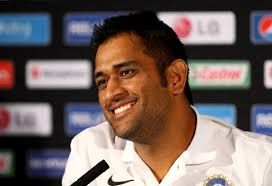
Captain Cool is also captain Empathetic
Ishant Sharma, even by his own bad standards, bowled a pathetic over that effectively turned the see saw towards Australia in the 3rd international match. 44 off 18 balls became 14 of 12 in a space of six eventful deliveries. Ishant Sharma was haplessly butchered by a bowling all-rounder (James Faulkner) and 30 runs were looted. One would normally expect the team captain to be up in arms against the bowler after such mayhem; the spectators certainly were (Ishant even got to feature in the latest Amul poster!)
However, quite the contrary, following was Dhoni’s response to Ishant’s dismal over:
“Nobody really wants to bowl a bad over, but if it happens the individual is more disappointed than anyone else in the stadium or the team. Ideally, it is best to leave him to his thoughts and then have a chat with him after the team is back at the hotel when he will be less frustrated and more accepting.”
That Dhoni is an alert cricketing mind is well documented. With this response, he gave us a glimpse into a different trait of his personality, related more with the human behavior than with cricket – empathy. While the circumstances must have been compelling to give Ishant an earful, Dhoni certainly resisted the urge.

The other side of MS: While Dhoni can be frighteningly emotionless for the opposition, he can also be intelligently caring for Indian players
The itch to take action compulsively in a challenging situation can sometimes be our very undoing. According to an Israeli researcher Micheal Bar-Eli, there exists something called as ‘Action Bias’ in which we feel compelled to do something in certain situations than be seen as ‘inactive’; the better solution though may have been achieved by waiting it out and assessing the options at hand. This, according to the research, is the reason why goalkeepers either dive to the left or right even when one third of the time the ball is targeted on the middle.
MS Dhoni is certainly one cricketer who avoids this ‘Action Bias’. That he didn’t chide Ishant then and there and would rather have a talk after letting Ishant settling down certainly affirms that. Dhoni is widely regarded as an astute captain but because of his media aloofness, few facets about the man’s nature are distinctively known. The one thing that is well known though is until Dhoni is fully convinced, he doesn’t commit himself. That is why DRS still doesn’t find favour with him. But the same conviction appears impressive when Dhoni uses it to manage his players.
In the recently concluded Champions trophy ’13 semifinal against Rajasthan Royals, Dhoni gave the first over to Ravindra Jadeja. The observant Harsha Bhogle remarked on air how Dhoni does these little things to boost his players. Jadeja had gone for 11.9 runs an over in the tournament before that match. As RR openers had looked to settle down first all throughout the tournament, it was unlikely that they would go after Jadeja. He ended up with an economy rate of 6.33 in the match.
Dhoni has got a hawk’s eye. What is delightful to see is as much as this keen eye is used to study the opposition, it is also used to gauge his players’ state of mind. Effectively, for Dhoni, it is not just the opposition that determines his next move. It is also the kind of mental space each player is in.
Of course, the unconditional trust of the parent body (BCCI in this case) in Dhoni is of paramount importance for the captain to take decisions with utter freedom. Dhoni, without an ounce of doubt, has it in a large measure.
It is a culture probably given roots by Sourav Ganguly (Under Ganguly, each young player was to be given a minimum of 5 matches) and further harboured by Rahul dravid and Anil Kumble. Surely, Dhoni has benefitted from playing under them.
Along with contributing to his effectiveness as captain, his empathy has also led to the players’ respect for MS Dhoni growing all the more. Surely, it adds an unconventionally pleasing dimension to this astute captain.